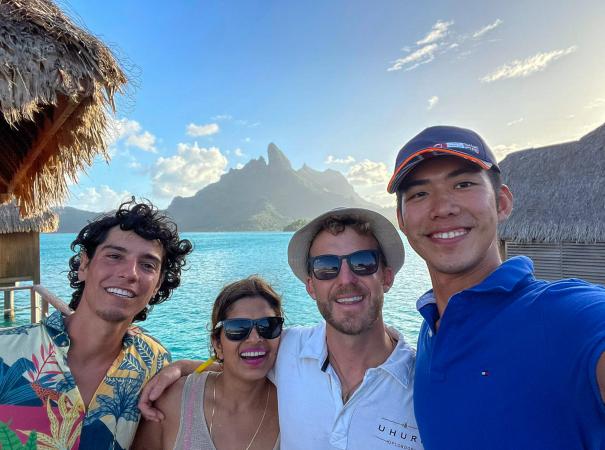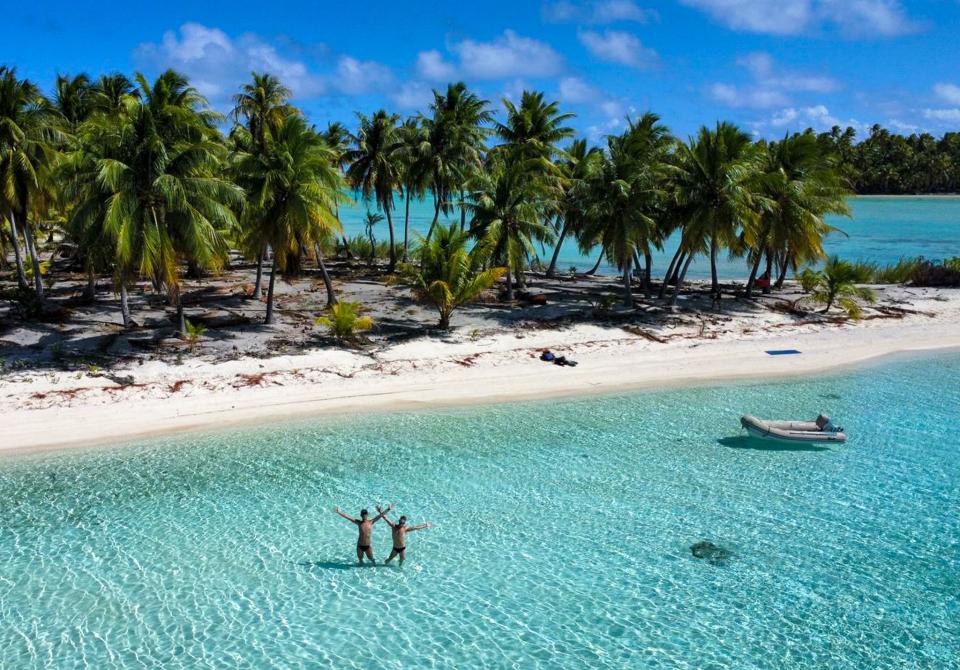“We’re effectively spending a year in French Polynesia, waiting for the world to open up so travel in the South Pacific is possible again. When we arrived in Tahiti our primary aim had been to escape from the world’s toughest lockdown in New Zealand. This was the only place open in the region, but now some places here are starting to move, or are planning to re-open in 2022. Fiji is now open to tourists.
“We’re making the most of being here – the pandemic has forced people to travel in a way they wouldn’t normally, it’s made everyone slow down. It’s really changed everything for me, without the pandemic I would have rushed around the world in four or five years and missed loads on the way. Last time I was here in French Polynesia for three months; looking back I realise it just wasn’t long enough.
“So this time we’re going much deeper. We’ve discovered a whole new way of travelling which is to slow down, down, down… It reflects the wider movement of people slowing down around the world – leaving their jobs, stepping out of the rat race for a couple of years or longer. Quite a few of the boats we’ve run into were heading across the Pacific from the Galapagos and have been here for the last 18 months. Boats in our anchorage are spending three months in one place. People spend their days pottering around, making jewellery, doing crafts on their boat and I’m a bit envious of that! So, everyone is learning to live a slower life and I have to say it’s so much more enjoyable!
With that in mind, we wondered if James had found time to take up any hobbies himself now all the renovation work on Uhuru is complete.
“I bought a saxophone to learn but somehow there’s always something else to do!” he explains. “I’m now turning my hand to the outside of the boat and really taking care of that – we put so much effort and time into making her look good, I’m constantly thinking about how to maintain her – so, deck work, that’s my hobby!
The year of getting to know her in New Zealand has made all the difference – she looks amazing. She’s so reliable and I’ve learned how to look after her properly so I can do it myself. There’s so little information out there about how to maintain a super yacht – no one’s written the deckhand’s guide to maintaining a super yacht, so you have to practice and learn and try different techniques. Every time I see another really nice boat, I ask the crew what they do to make her look so good. I’m really, really enjoying it, it’s a bit geeky but you know how it is…”
With all this hands-on experience, James really understands the ins and outs of maintaining his Oyster. He’s discovered lots of neat tips and tricks to make things easier. A great example is how he’s made the 200 hour oil change for the generator and engine faster and cleaner.
“It’s a really disgusting, filthy job that used to take two hours. We fitted a reverse pump, so now you put an empty can on one tube, a full one on the other and press the button. It empties the old oil and refills with fresh in just two minutes. We’ve done so many things like this that just make life a lot easier.
“To be honest you can spend unlimited time on maintenance and tech work. I’m spending two to three days a week on it, which is really enjoyable and she looks better for it. We have a photoshoot in a couple of weeks which I’m very excited about, she’s going to look amazing.”
When we spoke at the start of August, Uhuru was moored in Bora Bora at the start of her trip. James and the crew spent time diving off the boat, “hanging out with manta rays and sharks” and enjoying being in one of the most beautiful places in the world. One highlight was whale watching and swimming with humpback whales. They loved it so much they stayed there for four or five weeks. They then headed down to Raiatea, the second largest of the Society Islands.
“We made our way to my favourite anchorage ever. It’s called Motu Tipaemaua on the Eastern side of Raiatea. It’s an amazing 200m2 island with a deep water anchorage where you can moor the boat four to five metres from the beach, which is incredible for a 2.7m draft boat. You can literally step off your transom and onto the beach – unbelievable! For some reason no-one seems to know about it so we were very lucky to have it to ourselves.”
“That little island has the best coral I’ve ever seen in the world. We’d snorkel every day on the coral and explore the beaches around the island with the kayak. We were doing really nice drift dives every other day – I could have spent a year there and I wouldn’t have got bored!”
On the diving front, James is about to start his PADI Instructor’s course, so when guests come and stay on the boat, he can teach them to dive and share the natural beauties beneath the waves.
We put so much effort and time into making her look good, I’m constantly thinking about how to maintain her – so, deck work, that’s my hobby!
As soon as it became possible to fly back to the UK via France, James left the crew and Uhuru at Motu Tipaemaua and headed home for the first time in over a year and a half. London was a pretty big shock after being away so long.
“It was amazing to be home but crazy after being on the other side of the world. I didn’t want to be away from the boat for very long so I had to cram quite a lot in – running around the country to catch up with family and friends. My three siblings are scattered around, so I had to race between London and Leeds, Middlesbrough and Chichester – pretty much as far apart as you get. At least with all the rushing around I got to spend time with them and my nephews and nieces. I was so pleased to see everyone but also itching to get back to Uhuru.
“When I got back, most of the crew who sailed up with us from New Zealand realised they only had a couple of months left before they had to get home. So before they left we made a great plan to really enjoy the rest of French Polynesia together.
“The islands went into lockdown the day after I left for the UK, so the crew stayed on the boat and in the same place and enjoyed the peace and quiet. They did an amazing job of looking after the boat. The lockdown lifted a few days after I got back, so we set sail up to Fakarava where we’ve been for the last five or six weeks.
It was amazing to be home but crazy after being on the other side of the world.
“The island chain runs north-west to south-east, with easterly/north-easterly prevailing winds. So you can easily sail up and down the chain, mainly in protected waters on the Eastern side with these brilliant trade winds. We’ve been sailing just for the joy of it, which I haven’t done for a long time – 9.5 knots heeled a little, flying through flat blue water with blue skies, music on, everyone singing and dancing. It’s how sailing is meant to be, just incredible!
“The anchorage is halfway up the island and looks like something from a movie set, like The Blue Lagoon! I’ve never found beaches like this anywhere else in the Pacific and it’s deserted. Yet the amazing thing is how connected we are here – there’s 4G the whole way round the island, so we’re in paradise, in one of the remotest places in the world, and amazingly we have high-speed internet!”
In between sailing for fun and maintaining Uhuru, James and the crew have been diving with thousands of blacktip and silvertip reef sharks and exploring the islands.
“A friend came out to visit for a couple of weeks and we’ve been taking her around, exploring the islands, having beach bonfires and falling asleep under the stars. I love doing that, it’s just a wonderful experience.”
“At the moment the crew is me and two friends plus Dan, our incredible chef who looks after all the housekeeping. My partner, who worked on Uhuru with me for four months in New Zealand, is quitting his job and moving to live on the boat full-time, which will be epic!
“My friend Katie is out from the UK for a few years. It was all a bit of a shock to begin with, learning how to live onboard. She got really frustrated at times, feeling like she couldn’t do anything like she used to at home. You know, you can’t just go for a walk, you must know how to start an engine and drive the tender, tie knots, learn the ropes when we’re sailing. For people who aren’t used to life on the water it’s a whole new world, but she’s really settled into it now and she’s loving it.
“After being together for a few months, we’re now working really well as a team. We’ve all figured out our individual place and how we interact with each other. Having four people on a boat for a long time who don’t really know each other well can be pretty complicated. But we’ve worked through all that and the boat is working brilliantly too, she’s like a smoothly humming machine. So, in terms of looking after the boat and human relations, it’s pretty satisfying.”
Uhuru arrived in Tahiti in June and there is at least nine months left to enjoy the pleasures and beauty of this remote area. The plan is to sail up to the northern-most part of the Tuamotus to take in Taoa, Rangiroa and Tikehau before heading back to Tahiti for Christmas. Naturally, everyone’s thoughts are turning to the New Year and what’s next.
“It’s the big question everyone on a bluewater cruiser in this part of the world is asking. What’s going to be open and how soon? The Tradewinds mean you must sail West, there’s really only one way to go. You can go North to Kiribati but there’s nothing to see up there, so you set off west to the Cook Islands then Nui, Tonga and finally you get to Fiji.
“Once you get to French Polynesia, sailing in the Pacific is a real pleasure. It’s mostly two to four day passages, downwind with 18-22 knots of warm breeze and calm seas. You do get swells from the South from big storms in Antarctica that can make things a little unpleasant, but otherwise it’s pretty much perfect ocean sailing. It’s what Oysters were built for – consistent Tradewinds, in the same direction almost every day, 28 degree seas and air temperature, what’s not to like?”
With this in mind, we asked James if he ever finds himself pining for some heavy cloud and English rain.
“Funny you should say that – there was a cloud on the horizon today and I said to the guys ‘I’d love some rain’. They asked why? I told them I just want to go below, put on a hoodie and get cosy while it’s nasty outside!”
But, for the time being, James is more than happy to continue enjoying every day in paradise, with Uhuru fine-tuned and in tip-top order. In his words, what’s not to like?









